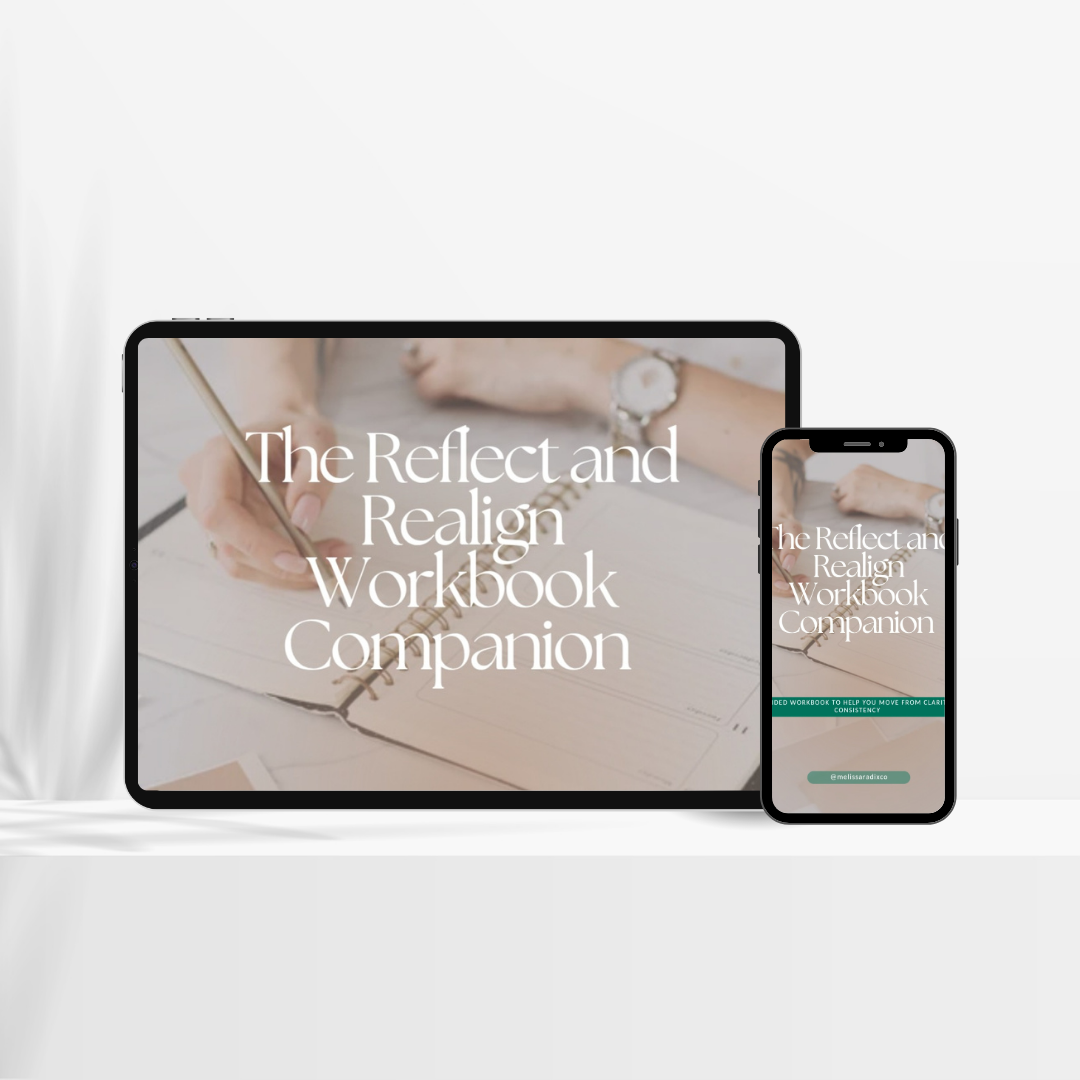Why Finding the Root Isn’t Enough: Turning Reflection into Real Growth
We talk a lot about doing the inner work, the journaling, the reflection, the uncovering of your “why.”
The problem is that once people find their why, they tend to wrap themselves up in it like a blanket.
They find their trauma and make it their truth.
“My parents were too hard on me, so now I’m like this.”
“I was never supported, so I’ve stopped trying.”
And while it’s important to understand where your patterns come from, finding the root isn’t the destination.
It’s just the first step.
Let me show you what I mean.
Meet quinn
Quinn had been sitting on a business idea for years, one that lit her up every time she thought about it. But every time she got close to starting, anxiety would wrap itself around her.
She’d convince herself she wasn’t ready. That she didn’t have enough experience. That she’d fail.
One night, scrolling on her phone, she stumbled across an ad for The Reflect and Realign Workbook: The Prework
(Yes, this is a shameless plug — but an honest one. You’ll see why in a second.)
As she moved through the pages, something clicked.
She realized her fear of failure wasn’t really about insecurity at all. It traced back to childhood. Years of being told to “make everyone proud,” to “do it right the first time,” to elevate the family name.
For the first time, she let herself exhale.
She found the root. She understood where the fear came from. She felt lighter. She wasn't the problem! Her parents were!
The Conversation That Took Her Deeper
A few weeks later, Quinn shared her breakthrough with her sister, Layla.
Layla smiled and said, “That’s so interesting, because the pressure to do well actually motivated me. I loved it.”
And just like that, Quinn felt the old sting of comparison.
She remembered how, as kids, Layla always seemed to win; the grades, the praise, the spotlight. And when Quinn couldn’t keep up, she quietly decided it was easier not to try.
Then came another realization — one that felt painfully honest but powerfully true.
“I’ve always been too sensitive. I’ve been afraid that people will compare me to Layla and I’ll come up short, which is why I sometimes don’t try.”
That’s a solid moment of self-awareness but this is where so many people get stuck.
They figure that naming the hard truth is enough.
They decide to “will themselves” to change.
The problem is, they’re still sitting in a dark emotional space.
They’ve labeled themselves as doing something wrong and are trying to force transformation from a place of guilt.
That’s blame, dressed up as self-awareness.
Blame: A Clever Form of Avoidance
Blame feels productive because it gives your mind a target, someone or something to hold responsible.
It creates the illusion of control: “If I can name the reason I’m like this, I can fix it.”
But in reality, blame anchors you to the past.
It’s like standing on the shore, staring at the wreckage, convinced that analyzing every piece will somehow rebuild the ship.
Truthfully, our brains loves blame because it feels safer than change.
It’s familiar. It’s predictable.
It’s the warm blanket that keeps you in bed, hitting snooze, because the coldness of a new day feels uncomfortable.
The Shift: From Blame to Learning
So how do you stop it?
You stop blaming and start learning.
Think of it this way. Blame says, “Someone’s at fault.”
Learning says, “Something valuable happened here.”
The first keeps you looping in what went wrong. The second pulls you forward into who you’re becoming.
When you uncover the root of your patterns you're gathering insights.
As a teacher, one of the most important things I ever taught my students wasn’t what to learn, it was how to learn. To stay curious. To ask questions. To see every mistake as data, not a definition. We lose that as adults. We stop asking “why?” like a child and start asking “who’s to blame?” like a lawyer.
But growth doesn’t happen in judgment, it happens in curiosity.
Reframing the Blame
Here’s where things start to shift.
What if the purpose of looking back wasn’t to find fault, but to find clarity?
There is a part in the Bible that says, “All things work together for good.”
It doesn’t say all things are good.
It means you can use your past, every disappointment, every pressure, every letdown, to shape something meaningful.
For Quinn, that realization could take a lot of forms:
Maybe she learns how to parent her kids with encouragement, not pressure.
Maybe she uses her story to empower other women who’ve lived in the shadows.
Maybe she finally builds the business, not to prove herself, but because she’s done playing small.
Now remember, the lesson doesn’t always arrive right away. Sometimes it takes time, for clarity to catch up to courage. However, if you stay open, the answer will always reveal itself in time.
When You Catch Yourself in the Blame Game, Ask:
• “What truth is trying to reveal itself beneath this pain?”
• “Am I trying to understand myself, or excuse my story?”
• “What part of me still believes this defines who I am?”
• “If this moment was my teacher, what lesson might it be offering me?”
Those questions hit deeper than “What is this teaching me?” because they invite both compassion and accountability, not judgment.
Those questions hit deeper than “What is this teaching me?” because they invite both compassion and accountability, not judgment.
Final Thoughts
Blame feels like protection.
Learning feels like exposure.
But one keeps you repeating the same story, and the other helps you rewrite it.
When you stop looking for someone or something to blame, you start moving forward.
Because real growth doesn’t happen when you find the root — it happens when you decide to rise from it.
If you’re ready to take that next step — to move from reflection to realignment — you can start with The Reflect and Realign Workbook Series.
The Prework helps you uncover the root.
The Companion guides you through the action.
Together, they’ll help you stop looping and start living.





